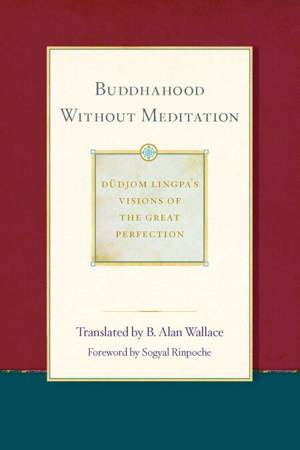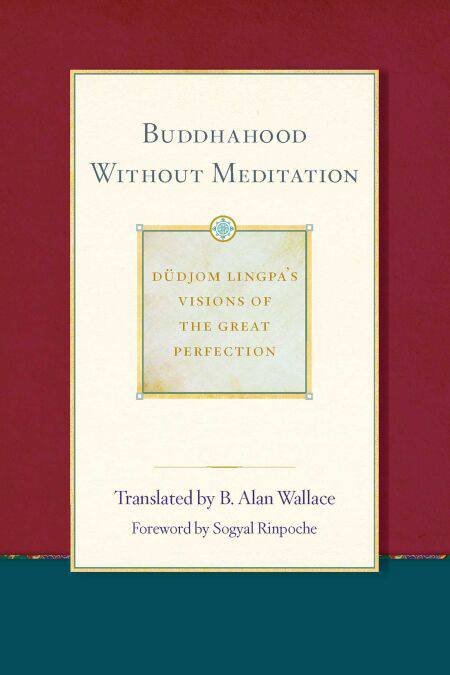
- Afhalen na 1 uur in een winkel met voorraad
- Gratis thuislevering in België vanaf € 30
- Ruim aanbod met 7 miljoen producten
- Afhalen na 1 uur in een winkel met voorraad
- Gratis thuislevering in België vanaf € 30
- Ruim aanbod met 7 miljoen producten
Zoeken
Buddhahood without Meditation E-BOOK
Dudjom Lingpa's Visions of the Great Per 02
Dudjom Lingpa, Sera Khandro
€ 13,41
+ 13 punten
Omschrijving
The revelations of Düdjom Lingpa, a highly influential mystic of 19th century Tibet, translated by B. Alan Wallace.
The practice of Dzogchen, the Great Perfection, is the pinnacle of the nine vehicles of practice taught in the Nyingma school of Tibetan Buddhism. The highly influential mystic Düdjom Lingpa (1835–1904) and his disciple Sera Khandro (1892–1940), the most prolific female writer in Tibetan history, here illuminate the methods to discover our own primordial purity and abide in uncontrived awareness.
Buddhahood Without Meditation: This is Düdjom Lingpa’s most widely taught visionary text. In it wisdom beings and historical figures in the Great Perfection lineage emphasize the view of cutting through (trekchö) to the original purity of pristine awareness via the four special samayas, or pledges, of the Great Perfection: nonexistence, oneness, uniform pervasiveness, and spontaneous actualization. At each stage of his spiritual progress, Düdjom Lingpa’s doubts are dispelled and his realizations enhanced by pithy advice.
The Fine Path to Liberation: Sera Khandro establishes the necessary motivation and conduct for receiving teachings such as Buddhahood Without Meditation. This sublime Dharma is to be seen in the context of the five perfections of the sambhogakaya: the teacher, place, time, disciples, and Dharma are fully perfected and must not be reified as ordinary.
Garland for the Delight of the Fortunate: Sera Khandro fills in the gaps of Buddhahood Without Meditation, explaining the metaphors, and spelling out the implications of the root text’s highly condensed verses. This is an essential key for unlocking Düdjom Lingpa’s profound wisdom.
The practice of Dzogchen, the Great Perfection, is the pinnacle of the nine vehicles of practice taught in the Nyingma school of Tibetan Buddhism. The highly influential mystic Düdjom Lingpa (1835–1904) and his disciple Sera Khandro (1892–1940), the most prolific female writer in Tibetan history, here illuminate the methods to discover our own primordial purity and abide in uncontrived awareness.
Buddhahood Without Meditation: This is Düdjom Lingpa’s most widely taught visionary text. In it wisdom beings and historical figures in the Great Perfection lineage emphasize the view of cutting through (trekchö) to the original purity of pristine awareness via the four special samayas, or pledges, of the Great Perfection: nonexistence, oneness, uniform pervasiveness, and spontaneous actualization. At each stage of his spiritual progress, Düdjom Lingpa’s doubts are dispelled and his realizations enhanced by pithy advice.
The Fine Path to Liberation: Sera Khandro establishes the necessary motivation and conduct for receiving teachings such as Buddhahood Without Meditation. This sublime Dharma is to be seen in the context of the five perfections of the sambhogakaya: the teacher, place, time, disciples, and Dharma are fully perfected and must not be reified as ordinary.
Garland for the Delight of the Fortunate: Sera Khandro fills in the gaps of Buddhahood Without Meditation, explaining the metaphors, and spelling out the implications of the root text’s highly condensed verses. This is an essential key for unlocking Düdjom Lingpa’s profound wisdom.
Specificaties
Betrokkenen
- Auteur(s):
- Vertaler(s):
- Uitgeverij:
Inhoud
- Aantal bladzijden:
- 344
- Taal:
- Engels
- Reeks:
Eigenschappen
- Productcode (EAN):
- 9781614292753
- Verschijningsdatum:
- 16/01/2017
- Uitvoering:
- E-book
- Beveiligd met:
- Adobe DRM
- Formaat:
- ePub

Alleen bij Standaard Boekhandel
+ 13 punten op je klantenkaart van Standaard Boekhandel
Beoordelingen
We publiceren alleen reviews die voldoen aan de voorwaarden voor reviews. Bekijk onze voorwaarden voor reviews.








